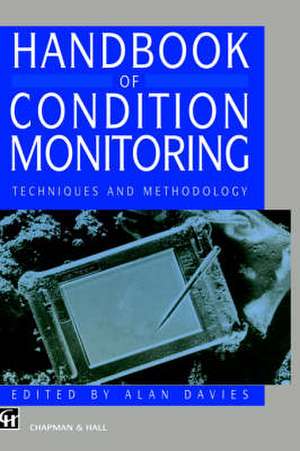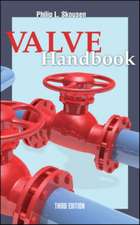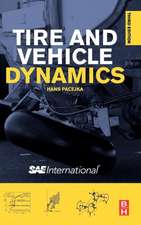Handbook of Condition Monitoring: Techniques and Methodology
Editat de A. Daviesen Limba Engleză Hardback – 31 dec 1997
The purpose of this book is to inform readers about techniques currently available in the field of condition monitoring, and the methodology used in their application. With contributions from experts throughout the world, the Handbook of Condition Monitoring addresses the four major technique areas in condition monitoring in addition to the latest developments in condition monitoring research.
Significantly, the Handbook of Condition Monitoring includes the following features:
- comprehensive coverage of the full range of techniques and methodologies
- accepted knowledge and new developments
- both technical and managerial content.
This is the essential reference book for maintenance technicians, engineers, managers and researchers as well as graduate students involved in manufacturing and mechanical engineering, and condition monitoring.
| Toate formatele și edițiile | Preț | Express |
|---|---|---|
| Paperback (1) | 1829.55 lei 43-57 zile | |
| SPRINGER NETHERLANDS – 12 oct 2012 | 1829.55 lei 43-57 zile | |
| Hardback (1) | 1836.31 lei 43-57 zile | |
| SPRINGER NETHERLANDS – 31 dec 1997 | 1836.31 lei 43-57 zile |
Preț: 1836.31 lei
Preț vechi: 2239.41 lei
-18% Nou
Puncte Express: 2754
Preț estimativ în valută:
351.49€ • 381.92$ • 295.44£
351.49€ • 381.92$ • 295.44£
Carte tipărită la comandă
Livrare economică 21 aprilie-05 mai
Preluare comenzi: 021 569.72.76
Specificații
ISBN-13: 9780412613203
ISBN-10: 0412613204
Pagini: 596
Ilustrații: XIX, 565 p.
Dimensiuni: 155 x 235 x 37 mm
Greutate: 1.01 kg
Ediția:1998
Editura: SPRINGER NETHERLANDS
Colecția Springer
Locul publicării:Dordrecht, Netherlands
ISBN-10: 0412613204
Pagini: 596
Ilustrații: XIX, 565 p.
Dimensiuni: 155 x 235 x 37 mm
Greutate: 1.01 kg
Ediția:1998
Editura: SPRINGER NETHERLANDS
Colecția Springer
Locul publicării:Dordrecht, Netherlands
Public țintă
ResearchCuprins
One Introduction to Condition Monitoring.- 1 Condition monitoring and the integrity of industrial systems.- 2 Condition based maintenance.- Two Techniques for Visual Inspection.- 3 Visual inspection systems.- 4 Thermal monitoring using infrared thermography.- 5 Surface and internal defect detection.- 6 Commercial applications of visual monitoring.- Three Techniques for Performance Monitoring.- 7 System quantity/quality assessment — the quasi-steady state monitoring of inputs and outputs.- 8 System input/output monitoring.- 9 System monitoring and the use of models.- 10 Commercial applications of performance monitoring.- Four Techniques for Vibration Monitoring.- 11 Review of fundamental vibration theory.- 12 Common vibration monitoring techniques.- 13 Fundamentals of vibroacoustical condition monitoring.- 14 Commercial applications of vibration monitoring.- Five Techniques for Wear Debris Analysis.- 15 Detection and diagnosis of wear through oil and wear debris analysis.- 16 Wear particle collection and evaluation.- 17 Lubricant analysis as a condition monitoring technique.- 18 Commercial applications of wear debris analysis.- Six Adopting a Condition-Based Maintenance Strategy.- 19 Financial implications and cost justification.- 20 Technique selection and implementation in condition monitoring.- 21 Pitfalls, benefits and collective wisdom.- Seven Research and Development in Condition Monitoring.- 22 Knowledge-based systems for condition monitoring.- 23 Future developments in condition monitoring techniques and systems.












